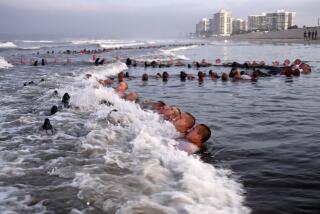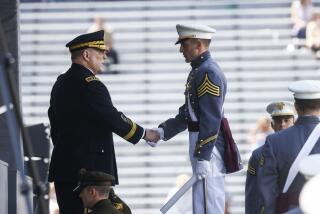War College Strategists Playing Catch-Up in Year of Political Upheavals
- Share via
NEWPORT, R. I. — Behind a locked door posted “Top Secret” at the U.S. Naval War College, scores of men and women in uniform and civilian clothes hover over banks of brightly colored computer screens. They are playing military games in a make-believe world that is on the brink of disaster.
As orders fly back and forth over radio-telephones, small images that represent the terrible machines and weapons of war--missiles, ships, planes and submarines--move about on the screens, stalking the enemy.
Near the end, young men in crisp white uniforms hurry about gathering computer printouts, which they deposit in plastic baskets labeled “classified material.” The shadows of others scurry across the huge map of the world that covers a far wall. A voice over a loudspeaker warns that the games are coming to a close. A sign on an opposite wall reads: “Loose Lips Sink Ships, Even in War Games.”
Now, for the first time since the 1950s, the adversary in these war games, played for more than 100 years at this military war college on Narragansett Bay, is not the Soviet Union.
With the end of the Cold War, the reunification of Germany and a friendship developing between the two superpowers, the Naval War College has scrambled this year to change its curriculum.
Rear Adm. Joseph C. Strasser, president of the college, which was founded in 1884, said that 90% of the curriculum for this year’s class of senior officers was updated over the summer. Although study here is focused mainly on naval strategy and operations, the student warriors, all with rank equivalent to an Army major or higher, are in the Army, Air Force and Marine Corps.
“An awful lot of what we did around here was geared to the Soviet threat and how the Navy would operate in a potential global war,” said Strasser, a mast-straight, 50-year-old career officer with a doctoral degree in philosophy of political science. “The Cold War is over now, and an extraordinary amount of the curriculum had to be changed to reflect that.”
Strasser and his staff said that many of the changes reflect current doubt that a full-scale nuclear war will break out between the United States and the Soviet Union. This year, the college is emphasizing conventional wars outside the European Continent. Other new courses deal with military involvement in civilian drug-law enforcement and with combating terrorism.
In the history of the college, the only comparable periods of sweeping curriculum change occurred in the early part of this century, with the advent of military aircraft, and in the early 1950s, with the emergence of two superpowers with nuclear weapons enough to destroy the world.
Navy Capt. Raymond Alcorn, a recent graduate of the school who is now dean of students, said he was shocked to see the sudden political upheavals in the world last year--particularly the destruction of the Berlin Wall.
“When I went through the course last year it was frustrating,” said the lean, intense veteran aviator who was a prisoner of war in Hanoi for almost eight years of the Vietnam War. “We were talking about things in class that no longer even existed.”
War games at the college are only a small part of its curriculum of strategy, national security decision-making and operations, but the games play a major role in the school’s mission. In many respects, they are the final exam.
Strasser said that in last summer’s global war game, top war planners from the three military services and a host of federal agencies, including the CIA, Department of Defense and U.S. Space Command, were confronted with three New World scenarios. (Students do not participate in the three-week summer war game, although they do play games of their own.)
“We called these three worlds ‘the good,’ ‘the bad’ and ‘the ugly,’ ” said Strasser, who assumed command of the war college last spring.
In the world called “ugly,” the Soviet Union was breaking apart and international relations were dominated by new and volatile ideological alliances. Arabs rallied to make trouble in the Middle East; old feuds were rekindled in Eastern Europe; China reverted to hard-line authoritarianism. Violence erupted in Third World nations because of hunger and despair, and a wave of terrorism was spawned by Latin American drug cartels.
In the “good” world, economics and trade dominated international politics. The “bad” world was torn apart by violent winds of nationalism as peacekeeping influences such as NATO and the United Nations lost their authority.
“The lessons we learned were incorporated into the curriculum as well as sent to Washington,” said Strasser. He added that the Pentagon has always considered the college’s war games important.
Strasser said that war in the Middle East was identified as a crisis in all three of the model worlds, but, he added that “it would be inaccurate to say we predicted the Iraqi invasion of Kuwait. It was just a possibility that was discussed.”
Navy Capt. John H. Heidt, director of the school’s War Gaming Department, said that the end of the Cold War era does not mean the games are less important.
“The world is even more dangerous now that the major balance of power is gone. A new world order has emerged, and each nation now has very competing interests,” he said.
Heidt said that the major change in the war games is that now, more emphasis is placed on political, economic and historical considerations--not to mention military budget cuts.
Although Operation Desert Shield, the name given to the U.S. troop deployment in Saudi Arabia, comes up often in class discussions, Heidt said that it is not an integral part of the curriculum.
“We are not involved in teaching current events,” he said.
Begun in 1887, the Naval War College games are considered the most sophisticated of the military’s three major war colleges, which include the U.S. Army War College in Carlisle, Pa., and the U.S. Air University in Montgomery, Ala. The curricula at those schools also have been changed to reflect recent events.
“We have the finest gaming facility in the world, primarily because we have the tradition,” said Robert Wood, dean of the Center for Naval Warfare Studies.
The Newport school is the oldest institution of its kind in the world and has taught many of the men and women who became the highest-ranking officers in U.S. naval history.
Wood and others point proudly to a letter from Adm. Chester W. Nimitz, commander-in-chief of the Pacific forces in World War II and a 1923 Naval War College graduate. It reads in part:
“The war with Japan had been re-enacted in the game rooms at the Naval War College by so many people, and in so many ways, that nothing that happened during the war was a surprise . . . absolutely nothing except the kamikaze tactics toward the end of the war; we had not visualized these.”


